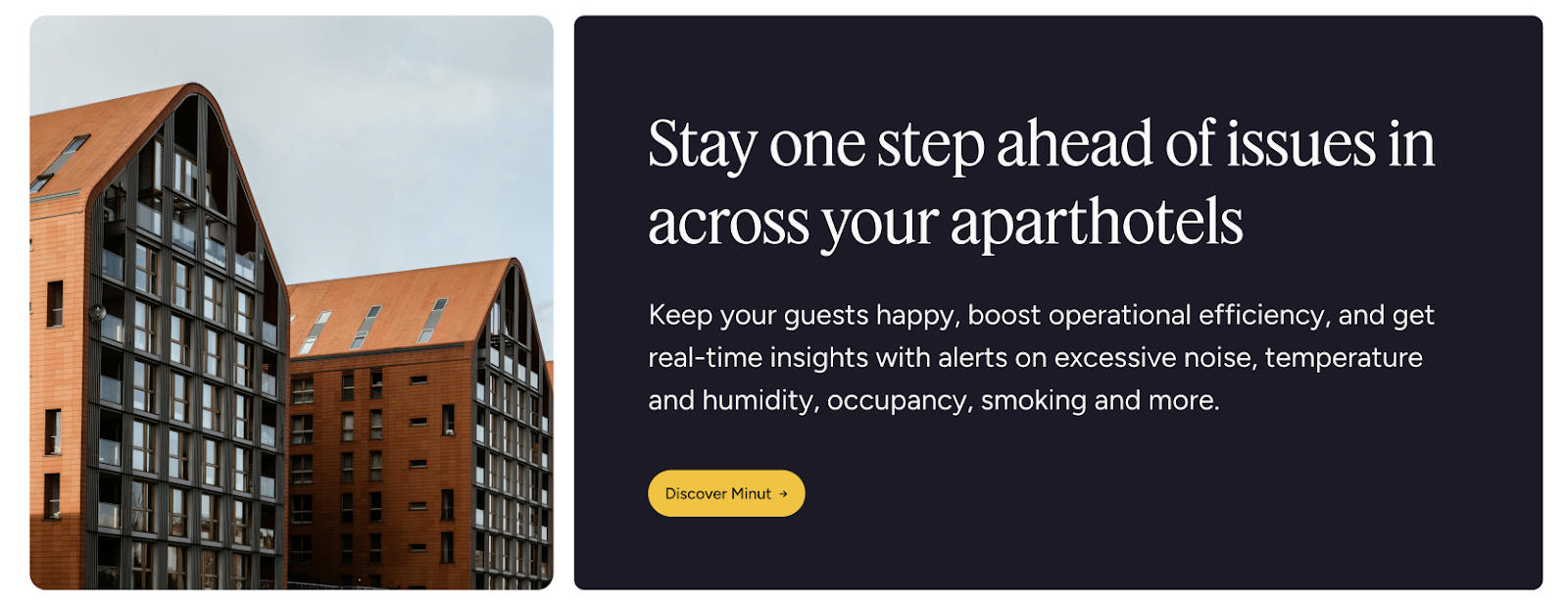


Aparthotels are becoming a strategic alternative for property managers navigating the tightening landscape of short-term rental regulations.
These hybrid accommodations combine the flexibility of short lets with the structure and compliance of hotel operations, offering a path forward as cities crack down on traditional STRs.
In markets like New York, Barcelona, and Amsterdam, stricter enforcement around zoning, registration, and length-of-stay rules has pushed operators to rethink how and where they scale. Aparthotels offer a more sustainable model in many jurisdictions by aligning more closely with commercial hospitality standards.
The European aparthotel market is responding accordingly. It's projected to grow at a CAGR of 9.48% through 2030, reaching a market size of $2.74 billion, while the global aparthotel industry as a whole has been valued at over $12 billion in 2025.
For property managers, this shift brings opportunity—but also complexity. Running an aparthotel isn’t the same as listing a flat on Airbnb. You’re operating in a new legal category, with different operational demands and guest expectations.
This guide breaks down what you need to know to run an aparthotel without the legal and operational headaches. From compliance and licensing to marketing and tech infrastructure, we cover the critical areas that will set you up for success.
An aparthotel is a fully furnished apartment that includes hotel-style services. Guests stay for a few nights, a few weeks, or longer. It’s built for flexibility, which is exactly what makes it appealing in today’s market.
What makes it different from a standard short-term rental is how it operates. Aparthotels typically offer:
They’re also (importantly) not hotels. Guests expect more space, a kitchen, and a more independent stay, but with some of the reliability and professionalism of hospitality.
For operators, this creates a more stable booking pattern and a broader guest profile than typical STRs. It also opens the door to corporate partnerships and repeat bookings.
Aparthotels sit at the intersection of hospitality and residential living. And that’s where the opportunity begins.

If you're thinking about running an aparthotel, you can’t treat it like a short-term rental. The legal requirements are different, and mistakes here cost money, licenses, and reputation.
Here’s what you need to get right.
Aparthotels are typically classified as commercial operations. That means your units must be in areas where short-stay accommodation is allowed. You’ll likely need:
Always check with your local authority or planning department to confirm whether aparthotel operations are permitted in your building or zone. For example, in London, aparthotels are allowed in mixed-use and commercial zones, but operators still need to apply for material change-of-use permission if the stay length is under 90 days.
Aparthotels are held to public accommodation standards, which are more demanding than residential codes. Requirements may include:
Many cities perform scheduled inspections. Failing one can lead to enforcement action or temporary closure.
Standard landlord insurance won’t cover aparthotel operations. You’ll need commercial hospitality coverage that protects against:
Make sure your policy includes public liability and business interruption coverage as well.
In most regions, aparthotel operators are required to register for:
Tax compliance can differ significantly from short-term rental requirements. Get proper accounting advice early to avoid unexpected liabilities.
Running an aparthotel takes more structure than managing short lets. You’re dealing with higher guest expectations, tighter compliance, and more moving parts. Efficiency comes from getting your systems, staff, and routines right from day one.
In practice, this looks like:
At the core of any aparthotel operation is a solid PMS. You need one built for multi-unit, short-stay inventory with features like:
Look for PMS providers that support both short and mid-term stays. Examples include Hostaway, Mews, and Guesty.
Guests expect a smooth arrival. That means no keys under the mat and no manual coordination.
Use smart locks, keypad systems, or integrations with access control providers to:
Pairing this with noise and occupancy monitoring helps ensure rules are followed without needing someone on-site.
Aparthotel operators can’t afford operational blind spots. Tools like Minut help you proactively manage your property without being physically present.
With one device, you can:
…All without cameras or recording.s The benefits of Minut include reduced guest complaints, prevention of property damage units, and ensuring you're compliant with local regulations.

Unlike STRs, aparthotels often run on fixed changeover schedules. Guests stay longer, and units are expected to feel more like home.
Set up:
Even if you’re working with third-party vendors, build repeatable systems and use automation where possible.
When you're managing multiple units across locations, you need full visibility. Your ops stack should allow you to track:
This makes it easier to scale your aparthotel business without losing control.
Aparthotels don’t fit neatly into the hotel or STR categories, so your marketing strategy shouldn’t either. You’re competing on both sides, so you need to position your property with precision, consistency, and a clear value proposition.
Here’s how to do it well.
Aparthotels perform best on platforms that cater to both short and extended stays. Prioritize:
List consistently across platforms using a PMS with OTA sync. Avoid copy-pasting STR-style descriptions—highlight services, stability, and mid-stay appeal.
Guests choosing aparthotels want reliability. That means:
Use automated guest messaging tools to confirm bookings, check in before arrival, and follow up after checkout. These touchpoints improve review scores and reduce manual workload.
Many aparthotel bookings come from guests staying 5 nights or more. Make sure your pricing model reflects that.
Tactics that work:
Extended stays lower your operating costs per night and attract guests with fewer complaints and higher review likelihood.
Differentiate your messaging based on guest type:
The better you speak to your audience, the more direct bookings and repeat guests you’ll earn.
Aparthotels can deliver strong, stable returns, but only if you run them with the right structure.
Too many operators treat them like dressed-up STRs or downscaled hotels. That’s where problems start.
Make sure you avoid:
Treating it like a short-term rental
Aparthotels aren’t residential units with a new label. If you skip planning permissions, insurance updates, or safety upgrades, you risk fines, closures, or worse. This isn’t only a regulatory issue; it’s about guest safety and operational credibility.
Make sure your licensing, building classification, and insurance match your business model.
Guests expect more from an aparthotel than a basic Airbnb stay. They want responsive support, hotel-grade cleanliness, and predictable amenities.
Miss the mark on service, and you’ll see it reflected in your reviews—and your occupancy.
You can’t manage multiple units manually. Without a reliable PMS, automation tools, and monitoring systems in place, small issues will pile up and start costing you time and revenue.
Efficiency comes from structure. Automate what you can, and centralize what you can’t.
Aparthotels succeed when priced for flexibility. If you copy hotel-style dynamic pricing without factoring in stay length or operating costs, you risk leaving money on the table or driving the wrong type of booking.
Use a mid-stay-friendly pricing model with clear rules for discounts and minimum stays.
Once a guest checks in, many operators go quiet. That’s a missed opportunity. Simple check-ins after day two or reminders about amenities can reduce issues, increase satisfaction, and generate better reviews.
Your communication workflow shouldn’t end at check-in—it should adapt to longer stays.
Aparthotels aren’t the right fit for every property or team. They require more structure than short lets and more flexibility than hotels. But when the model works, it delivers reliable bookings, longer stays, and higher margins with fewer turnovers.
Here’s how to evaluate whether it’s the right move.
In these scenarios, the aparthotel model gives you structure, scalability, and a stable guest profile.
Aparthotels require more upfront setup, but they also offer more operational control. The key is knowing whether your business is equipped to meet the standard.
When you consider launching an aparthotels, you should consider:
If the answer is yes across the board, you’re in a strong position to launch (or grow) an aparthotel operation.
Aparthotels sit in the middle ground between short lets and hotels. They give you flexibility, longer bookings, and access to guest segments that are growing year over year. But they also come with real legal, operational, and service standards that can’t be skipped or improvised.
If you plan properly, invest in the right systems, and set clear expectations for your guests and your team, aparthotels can be a reliable, scalable part of your portfolio.
Whether you’re converting units or launching a new building, getting it right on compliance, safety, and operations is what protects your investment.
Minut gives aparthotels operators the visibility needed to build smooth, respectful operations that drive 5-star reviews.
